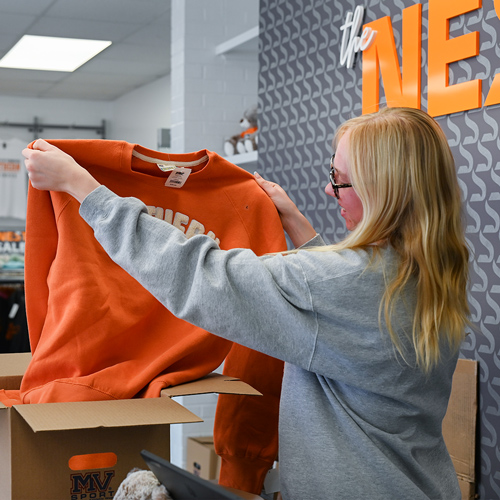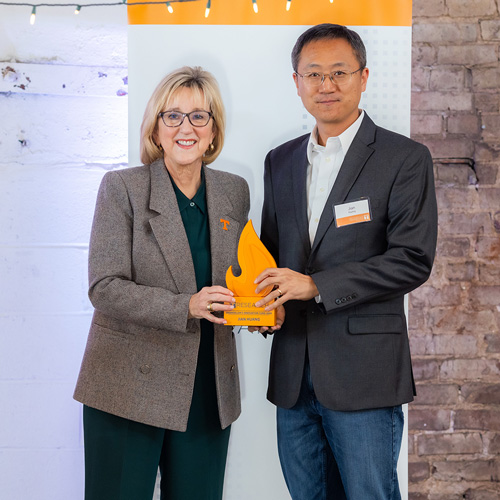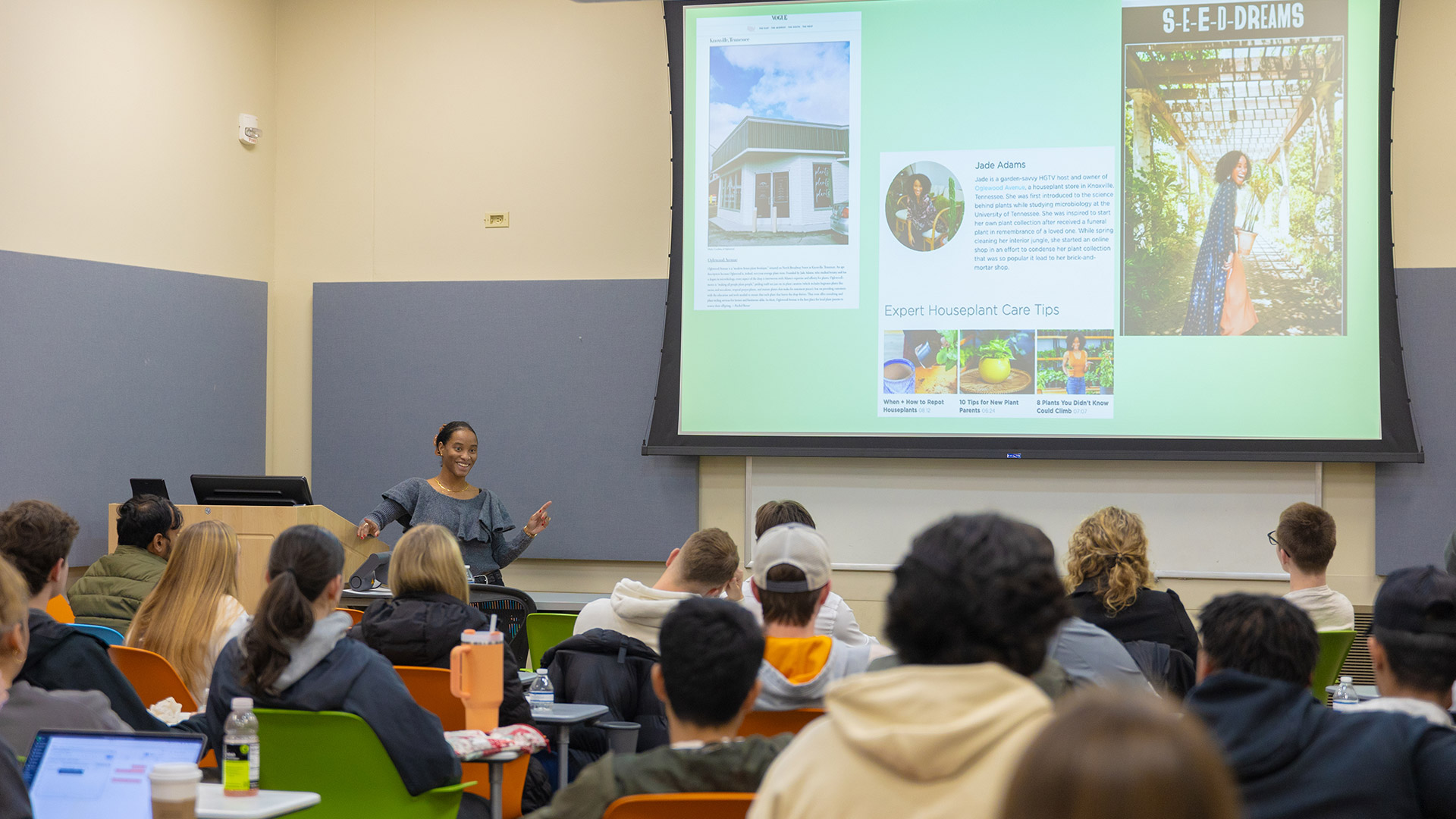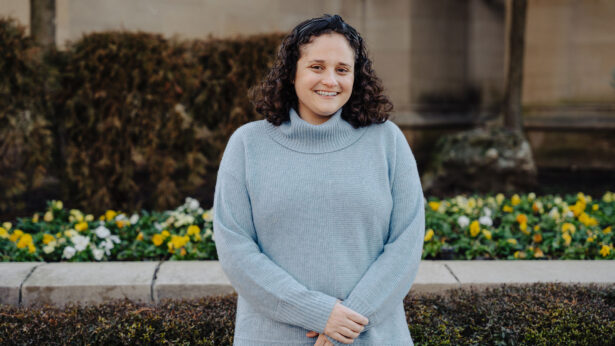UT Knoxville
Starting a business or side hustle can be hard. But, at UT Knoxville, a thriving entrepreneurial ecosystem is equipping student entrepreneurs with the skills and resources needed to start their own companies.
For nearly two decades, UT Knoxville’s Anderson Center for Entrepreneurship and Innovation has been a resource for entrepreneurship across the state of Tennessee. Housed in the Haslam College of Business, the center helps faculty, staff, alumni and students of all majors acquire meaningful skills, experiential learning opportunities and connections with mentors and tools that enable them to start and grow their new businesses. Since its inception in 2009, the center has awarded more than $1 million in pre-seed funding to student start-ups through competitions like the Boyd Venture Challenge, the Graves Business Plan Competition and Vol Court.
During the 2023-24 academic year, the Anderson Center’s start-up coaches hosted more than 250 hours of meetings with entrepreneurs from across campus seeking targeted high-impact mentoring. More than 1,500 students enrolled in entrepreneurship courses with more than 150 students attending the center’s events.
Undergraduate students from any major can earn an entrepreneurship minor through the center. The curriculum includes interdisciplinary courses offered by seven of the university’s colleges and evolves with new trends in business, technology, entrepreneurship and innovation. The university saw a 26 percent increase in the number of students pursuing the entrepreneurship minor in the 2023-24 academic year.
Anderson Center programs empower students to bolster their degrees with hands-on learning, preparing them to enter the workforce—or to forge their own paths as business owners.
— Maggie Palmer


UT Chattanooga
UT Chattanooga is empowering veterans to start and grow businesses through the Veterans Entrepreneurship Program (VEP). Led by Sandy Cordell, assistant director of programs and projects in the Gary W. Rollins College of Business, the VEP has supported 186 veteran entrepreneurs since its inception in July 2012—resulting in nearly $90 million in revenue and 47 government contracts.
The program is “for veterans who want to start or grow a business,” Cordell says. “They learn all the nuts and bolts of launching a business, and we hope they will turn around and hire more veterans and grow this network.”
The three-phase VEP includes a five-week online business plan development course; an intensive eight-day boot camp on UTC’s campus—which Cordell calls “the heart of the program”—where participants attend workshops led by business experts, engage with community leaders and build networks; and 10 months of mentorship. She notes that support often continues beyond the formal program “because that part really never stops.”
A Navy veteran, Cordell brings personal experience to her role, having co-founded an industrial tool sales business with her husband after their service. The business eventually closed due to challenges like cash flow—a learning experience fueling her passion for the program. “Knowing now what we did wrong and being able to help veterans avoid those pitfalls is extremely satisfying,” she says.
Thanks to presenting sponsor Walden Security and other donors, the program is free for participants. “There’s so much crossover between being a business owner and being in the military,” Cordell says. “Leadership skills. Problem-solving skills. Managing crisis situations. However, veterans still struggle when they leave the military and return to the civilian world. A lot of them want to be their own boss.
“The best part of my job is helping them see that success.”
— Chuck Wasserstrom
UT Martin
At UT Martin, not only is entrepreneurship encouraged among faculty, staff, students and alumni, but the university also provides all the necessary resources for individuals with business-venture goals. The College of Business and Global Affairs is home to the Regional Entrepreneurship and Economic Development (REED) Center, the region’s powerhouse for all entrepreneurial resources.
Established in 2005, the center meets the needs of existing and potential business owners through one-on-one consultations and interactive training programs. It offers a unique partnership among regional governments, economic development agencies, financial institutions and more. “The REED Center is more than a hub; it is a community of support and empowerment,” says director Landy Fuqua.
The center offers a long list of resources for established businesses and beginning entrepreneurs. The Runway, a co-working space located in the center, provides small-business owners and remote workers with a shared space to connect with others on a professional level. Other resources include seminars and training sessions.
The REED Center has played a pivotal role in the foundation of businesses throughout West Tennessee. Realty groups, medical offices and advertising firms are just a few of the organizations to walk through the center’s doors.
Morgan Stone, a UT Martin nursing graduate and longtime nurse practitioner, is one of the REED Center’s many success stories. Stone opened her clinic, Cornerstone WholeHealth 360, to offer holistic health care to Northwest Tennessee. “Landy’s team helped me craft a business model that I couldn’t even put down on paper. They held my hand and turned a passionate vision into a thriving, sustaining and life-changing holistic health care clinic,” Stone says.
Having served the community for almost 20 years, the REED Center is living up to its mission of meeting the needs of existing and potential business owners. “Our commitment to supporting businesses, fostering innovation and contributing to regional economic development remains unwavering,” says Fuqua.
— Emma Bruner


UT Institute of Agriculture
UTIA exists to serve farmers, producers and related businesses of the state. Through a host of programs, classes, workshops and one-on-one consulting, the institute helps residents start new enterprises or improve existing ones passed down through generations.
Despite data that shows decreasing farmland in Tennessee, the business of agriculture is booming, and UTIA outreach is growing to meet the demand. “The entrepreneurial spirit is alive and well on our Tennessee farms today,” says Rob Holland, director of the Center for Profitable Agriculture, a 27-year-old UT Extension program started in partnership with the Tennessee Farm Bureau. The center focuses on value-added agricultural enterprises such as agritourism and selling produce, meat and farm-based products like cheese and soap directly to consumers, which adds up to about $142.8 million a year.
UT Extension also offers several certificate programs for beekeepers, nursery crop producers, backyard poultry producers and lawn care professionals, to name a few. Farm specialists using the MANAGE program, which stands for Measuring, Analyzing, Navigating, and Achieving Goals Effectively, visit farm owners and families to help assess the financial aspect of their businesses.
Classes and organizations within the Herbert College of Agriculture and College of Veterinary Medicine teach students about managing their own business or practice. Courses range from beginning farmer to advanced farming experience. Many students who major in food and agricultural business graduate with a minor in entrepreneurship through the Haslam College of Business on the UT Knoxville campus.
— Elizabeth A. Davis
UT Southern
UT Southern is launching Firehawk Entrepreneur Boot Camp, an immersive program designed to equip high school and college students with the skills and knowledge needed to develop successful business ventures.
Led by a team of faculty and staff, including Shelley Sarmiento, manager of The Nest Spirit Shop; Nan Wakefield, chair of the Johnson School of Business; and Todd Jones, director of admissions, the boot camp will offer hands-on workshops, mentorship opportunities and real-world problem-solving activities. Students will explore key areas such as business planning, market research, branding, funding and leadership development.
A key component of the program is its interactive approach, allowing participants to gain both theoretical knowledge and practical experience. The Nest Spirit Shop will serve as a working model, giving students insight into retail operations and brand management. The program also will serve as a recruitment initiative with Tennessee high school administrators and teachers helping to promote the program to aspiring young entrepreneurs.
The program will be offered during the academic year and summer, ensuring accessibility for students with different schedules. By the end of the program, participants will have developed a concrete business strategy, gained valuable industry connections and built the confidence to pursue their entrepreneurial aspirations.
More than just a business camp, this initiative aims to foster a growth mindset, encouraging students to innovate, adapt and succeed in today’s evolving business landscape—all while having fun along the way.
— Aimee Rose


UT Institute for Public Service
Whether you want to register to become a vendor for the federal government or are recruiting new businesses to your community, the UT Center for Industrial Services (CIS) has a solution.
CIS delivers technical assistance and training to businesses and communities throughout Tennessee. Through the APEX Accelerator program, consultants across the state provide a range of services to assist Tennessee businesses to compete successfully in federal, state and local government contracting. On average, businesses that receive counseling report they secure government contracts worth more than $1.8 billion annually. The APEX program counsels more than 500 clients a year and schedules more than 100 networking and training events around the state.
CIS also administers the Tennessee Certified Economic Developer program that offers training, continuing education and professional development opportunities to economic development practitioners around the state. The certification requires completion of the Tennessee Basic Economic Development course, six specific subject matter core courses and eight hours of elective coursework. Course topics include business retention and attraction, entrepreneurship and small business development and a marketing and attraction course.
The Tennessee Manufacturing Extension Partnership (TMEP) also is housed within CIS. Consultants who work within TMEP provide expertise and training to help Tennessee manufacturers increase profitability.
— Susan Robertson
UT Health Science Center
The College of Dentistry has an outstanding reputation for the clinical excellence of its graduates. However, beyond expert instruction in dental skills, the college also is intentional about teaching its graduates other skills that will be critical after graduation.
Fourth-year dental students are required to take a “Practice Implementation and Management Course” as they start their senior year. The course consists of 24 hours of class with lectures on various topics they will need to know in the future.
Staley Colvert, vice chair of general dentistry and an associate professor, says topics include business plans, financial security, staffing an office, practice purchase, office design, price, value, practice appraisal, equipment and software, insurance and other aspects of dental practice.
“I bring in lecturers who are experts in the various areas,” Colvert says. “The D4’s also go out into private offices for two half days and study and learn the business side of a practice, and they return with their information for a roundtable discussion.” The students are required to attend all classes and pass a mid-term and final exam. “The students report that the class is informative and valuable,” Colvert says.
Colvert offers this advice to students: “To safeguard your investment, know that the practice of dentistry is a business and must be treated as such.”
— Peggy Reisser


UT Research Foundation
UT Research Foundation (UTRF), a nonprofit with a rich 90-year history, is dedicated to translating the university’s innovation and discovery into products and services that advance the public good. With offices in Knoxville and Memphis, it facilitates
the commercialization of innovations, supports UT’s research, nurtures and supports an entrepreneurial culture and promotes economic development for the state and beyond.
Through programs like the Accelerate Fund and Venture Launch Program, UTRF provides essential funding and support for startups. The $5 million Accelerate Fund is a pre-seed/seed fund that offers financial assistance ranging from $50,000 to $250,000. Startups backed by this fund are provided with a business mentor who meets with the founder regularly.
UTRF’s Venture Launch Program was created to support innovation commercialization throughout all UT’s campuses and institutes. Through its Executives-in-Residence and Entrepreneurial Fellow Program, it aims to bolster, connect and catalyze the entire System-wide entrepreneurial ecosystem.
The Maturation Grant Funding Program awards up to $20,000 annually and helps UT researchers further develop their technologies with commercial potential through well-defined go/no-go diligence milestones. In the Business Incubator, UTRF provides office space and resources for any startup with a UT connection. This incubator serves as a launchpad for companies, helping them become self-sustaining while connecting them with broader entrepreneurial communities.
By connecting UT research to the commercialization process, offering financial support, and creating a collaborative environment, UTRF empowers innovators to bring their innovations to products and services, fueling economic development and creating new opportunities for all Tennesseans.
— Emma Grace Pytko



